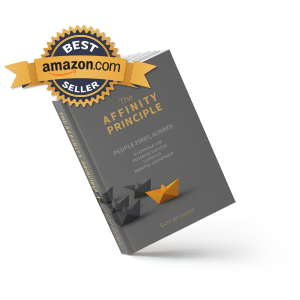The Unique Value of Executive Coaching
 By Grant Ian Gamble | June 23, 2020
By Grant Ian Gamble | June 23, 2020
Grant Ian Gamble is a business growth consultant, executive coach, author, and keynote speaker. He works in a broad array of industries helping companies build teams, navigate change and drive growth.
In a recent study by Stanford’s Center for Leadership Development and Research, nearly 100% of CEO’s surveyed said they enjoy the process of receiving coaching and leadership advice. Yet only one-third of those same leaders receive any formal coaching.
Of those CEO’s receiving coaching, 78% said it was their own idea to embark on the coaching journey. 21% said the catalyst came from the Board.
When asked what the key areas they were most seeking improvement in were, the cohort suggested the following:
o Sharing leadership and delegation
o Conflict management
o Team building
o Mentoring

From a Board perspective, talent development, mentoring, and succession planning were critical skills for their leadership to develop. They also saw sharing leadership and delegation skills at paramount for their leadership team.
It is obvious from this study that leaders and organizations worldwide are recognizing the power and value of executive coaching.
It is also apparent that as executive coaching becomes more commonplace, it is no longer limited to the CEO’s of massive organizations.
More and more leaders and entrepreneurs are turning to coaching, even in the early stages of a company’s journey. That’s not surprising, given how effective executive coaching can be in leadership development and how critical those high growth times are in a company’s lifecycle.

A trusted and confidential relationship with a coach creates a unique opportunity for leaders to reduce the isolation they often feel and to positively transform behaviors, beliefs, habits, and mindset. This ultimately amplifies and enhances the leader’s performance and the company’s viability.
When done well, executive coaching can be an excellent leadership development investment.
When you decide to embark on the coaching journey, there is a lot to consider. Finding a great coach that resonates with you is critical. Equally critical is your coachability. No matter how good a coach is, if you don’t check your ego at the door and be open and vulnerable, the quality of the coach is irrelevant.
If you are considering embarking on this journey, here are some of the key benefits you might expect from executive coaching:
1. An Independent Sounding Board
If your coach is really doing their job, they will be honest and forthright with you. You will be able to talk with them about personal and professional challenges and opportunities and in return receive open and honest feedback and support. This can reduce feelings of isolation and provide much-needed insights that are hard to gather without trusted third parties. The ability of the coach to be a truth-teller is critical and this rests in the fact that they are not relying on you for their income, nor are they a family member. This gives your coach the freedom to drop truth bombs when needed.
2. Self-Awareness
Research has shown that self-awareness in leaders is highly correlated with organizational effectiveness and profitability. Team members prefer to follow leaders who see themselves clearly and are willing to be vulnerable and transparent with the team. When you begin the coaching journey, your coach will want to gather feedback from your peers and team to get a sense of how you are perceived presently.
Many coaches use behavioral assessment tools to complement the data they receive from their peers and team. Throughout the coaching engagement, your coach will share those perceptions of you based on observations, interactions with others, and any other tools they employ. This compilation of data points helps your coach provide effective feedback and coaching to help you build a clearer awareness of where you’re strong and where growth opportunities exist.
NOTE: When I am working with senior executives, I rely on a Behavioral Strategy for Accomplishment instrument which provides an in-depth description of your behavioral patterns, and helps you be aware of and understand your behavioral style. I do this in conjunction with Tom Perrin, a Ph.D. in Psychology, who spends a total of three hours, one-on-one with you to help further clarify your key strengths and opportunities for growth.
3. Leverage Your UVP’s
Everyone has Unique Value Propositions and as a leader, it is critical to recognize and leverage these strengths within your organization. A perceptive and supportive coach can help you see the uniqueness and value of these capabilities and to help you lean into them to enhance your impact on your team and your company.
4. Help Define and Refine Your Goals
We all have goals and dreams, but often over time clarity fades and focus gets distorted around what is inherently important to you. An executive coach helps you bring focus to your goals and offers support in their achievement. As a consistent resource to you, your coach can bring those goals back into focus when needed and can also help you re-define and refine them as necessary. Your coach can also help equip you to develop focus around the goals and priorities within your company.
5. Processes
A skilled coach will have processes for helping define key issues and challenges. These tools and questions help you focus and prioritize the core challenges and opportunities that you face at any point in time. Sometimes, simply prioritizing what you tackle next and keeping a focus on that task is enough to positively impact your trajectory. The coach should also have tools to help you in processing these key focus areas.
6. Skills and Knowledge
A talented coach will provide insights and knowledge that augments or complements that which you bring to the table. They will also help you develop or enhance skills that are necessary for you to succeed in your environment. The goal of the coach is to ultimately amplify your leadership and management skills and potential, and operational wherewithal.
7. Adapt Responses and Priorities
As your company grows and morphs, it will go through fundamental changes that require you to grow and adapt your responses and priorities. Your coach provides insights and counsel to help you navigate these many phases of change and growth. As you move from working hard “in your business” to working hard “on your business,” your executive coach will help and support you in these transitions. At times, this may mean bringing in complementary team members to expand your ultimate potential. The consummate executive coach can be a powerful resource to help define and divine healthy transitions and additions to your team.
8. Clarity of Team
As your company grows and your team expands, your ability to keep team members in perspective can get distorted by familiarity, distance, and/or time. It is critical for you, as the leader, to keep perspective on the capabilities and deficits existing in your key team members. As you make critical executive decisions around promotions, changing roles and responsibilities, disciplinary actions, and even dismissals, a perceptive coach can offer insights and reflections on those important aspects of your team as an independent resource and an outside perspective. Often, talking through thoughts and concerns around team members with an independent and confidential resource can help give you clarity.
9. Embrace Diversity
We tend to attract and hire people like ourselves. While that feels good at the time, the need to attract complementary and diverse team members is critical. A talented coach can help you see any of these monochromatic threads, if they exist, and help you expand your ability to attract and retain a diverse pool of talent.
Diversity in your team does not only relate to demographics, it also relates to work style and behavioral tendencies such as assertiveness, sociability, consistency, detail orientation, and self-confidence. An experienced and intuitive coach can help you build a diverse, yet homogeneous team that is well rounded, collaborative, and effective.
10. Self-Care
Bookending self-awareness is self-care! Often, we’re busy taking care of everyone else but ourselves. The coach can help you review your habits and behaviors around self-care and attune you to ways to build positive momentum in your quest for good health and life balance.
11. Confidentiality
Confidentiality is sacrosanct in the coach/client relationship. Any coaching agreement should detail the confidentiality that is also implicit in the relationship. Being able to speak frankly and in confidence with your coach provides the ability to explore areas that you may not be able to discuss with team members, stakeholders, or your family.
12. Results
The ultimate upside of engaging a talented coach is the results. An effective coach is going to help you gain clarity around personal and professional objectives and opportunities. They can help you leverage and build on your strengths. Your coach can be that resource that helps you move to the next level organizationally and personally.
When it comes to picking a coach, it is much like hiring any team member. You are looking for someone who exemplifies the values you see as important. Someone who doesn’t just talk the talk, but they also walk the walk.
I have worked in the consulting and coaching realm for many years and have seen consultants and coaches who represented themselves as subject matter experts, having never truly experienced or delivered the results they were purporting they could get their clients to achieve.
I’ve seen people enter the coaching and consulting realm because they couldn’t make it in the areas they were positioning themselves to consult in. That is obviously a recipe for disaster if that coach or consultant expounds the philosophies that have caused them to exit that very same sector.

If you want a coach who can help you grow in the areas in which you need help and support, you want a coach that has truly succeeded and mastered those areas themselves. If you know the coach, have seen them over time, and you know them to be subject matter experts in the areas in which you need help, that is ideal. If you don’t know a coach that is accomplished in the areas you need help, then you need to go through an interview and hiring process, as you would with any other role you need to be filled within your organization.
There is one other critical element to this coaching puzzle, and that is you!
You need to have a willingness to not only invest the money, but the determining element of a coaching relationship is the coachability of the leader. So, what does a coachable leader look like?
Here are a few things you should ascertain about your coachability before committing to an executive coaching relationship:
1. A Willingness to Learn
Just by embarking on the journey of finding an executive coach, you’re expressing a willingness to learn. That willingness needs to be underwritten by a thirst to engage in the exercises and embrace the learnings your coach is bringing to the table. That may involve reading books or articles, completing exercises, seeking other resources, and actively pursuing learning on an ongoing basis.
2. Personal Accountability
It is critical for the leader to take responsibility and be accountable in the process. As the coach gets a clearer and clearer picture of you and your business, as a trusted third party, they will likely bring some things to the table that could make you feel uncomfortable. Owning those issues or behaviors is tough. As the leader, it is unlikely that many, if any, of your team members will be perfectly frank with you about any issues or behaviors that they feel are negative or destructive to your organization. If your coach brings some things to light you don’t want to hear, you need to be able to process those observations and own them when appropriate.
3. Making the Time
Allocating and prioritizing time for coaching is critical. Coaching is professional development and needs to be a part of the leader’s allotment of their time. Much of what coaching is doing is helping you work on yourself and on your business. Too often our time as leaders is eaten up working in the business. When we commit and adhere to the commitment of time for coaching, this creates leverage, and many of the things that were repeatedly challenging you as a leader get resolved and disappear from your every day, actually lightening your load. Equally important is making the time to do the homework. At times, your coach will ask you to complete a task or assignment and taking the time to complete these activities on the timeline agreed to is imperative in the coaching journey.
4. Vulnerability, Transparency, and Trust
It’s hard to share some of the most challenging aspects of our work and our personal lives. These admissions are often uncomfortable and confronting. When you’re working with a coach, the very nature of the relationship demands a degree of vulnerability and transparency that allows the coach to guide you through the process toward real and systemic growth and change.
As a result of the confidentiality and intentionality of the coach working through these issues and challenges with you, a relationship of trust will grow. This trust will be underwritten by the authenticity, logic, and empathy of the coach and this is the basis of the Triangle of Trust.
More and more, leaders are acknowledging the power of coaching in their personal and professional development. If you feel you are ready to embark on a coaching journey or are not getting everything out of the journey you’re already on, use this guide to determine your level of readiness and to help find the executive coach that best fits your needs and sensibilities.
The investment will be well worth your time!
RECENT ARTICLES
Fill out the form below and receive a PDF download of "6 Key Strategies to Engage Untapped Fitness and Wellness Market Segments"
Let's Connect!
CUSTOMER EXPERIENCE, TEAM ENGAGEMENT & WORKPLACE WELL-BEING: AFFINITY OS™ | WELLNESS INTEGRATION | MINDFUL LEADERSHIP: "THE AFFINITY PRINCIPLE"
0475 866 592

The Affinity Principle™ by Grant Gamble presents a formula for business success through a people-centric, mindful leadership approach.
PEOPLE FIRST, ALWAYS.

